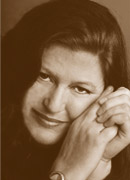
Alice LaPlante has been teaching writing for 20 years and is the editor of the popular creative-writing textbook
Method and Madness, But it wasn't until this year, at age 52, that her first novel was published (by the wonderful independent press Grove/Atlantic).
It was worth the wait. Turn of Mind has been one of the most buzzed-about books of the summer. A page-turning literary mystery with striking prose, the novel is told from the point of view of Dr. Jennifer White, a retired orthopedic surgeon who is suffering from Alzheimer's. Due to her condition, Jennifer is faced with a deeper horror: she can't remember if she's had anything to do with the death of her best friend.
In a starred review, Kirkus praises, "LaPlante tells the story poignantly, gracefully, and artistically. Jennifer White, as a physician, as a wife, as a mother, leaps from the pages as a powerful character....A haunting story masterfully told."
And Ann Packer exclaims,
An electrifying book, impossible to put down. Gripping, thought-provoking, humane, funny, tragic, it is masterfully done, a tour de force that can't be a first novel ? and yet it is. I'll read whatever LaPlante writes next, and the sooner the better.
We were so deeply affected by Turn of Mind, we chose it for Volume 28 of Indiespensable.
÷ ÷ ÷
Jill Owens: How did Turn of Mind begin?
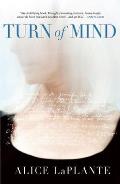 Alice LaPlante: Well, my mother has Alzheimer's. So, it's a subject that's been on my mind for many years. I'd been writing about it personally, just in my own journals, trying to figure things out. I'd also been working on a novel that wasn't really going anywhere. And one night my partner and I were sitting watching one of the episodes of Sherlock Holmes, with Jeremy Brett, on PBS.
Alice LaPlante: Well, my mother has Alzheimer's. So, it's a subject that's been on my mind for many years. I'd been writing about it personally, just in my own journals, trying to figure things out. I'd also been working on a novel that wasn't really going anywhere. And one night my partner and I were sitting watching one of the episodes of Sherlock Holmes, with Jeremy Brett, on PBS.
He said, "Do you think you could ever write a mystery?" And I said, "No way. My mind doesn't work that way."
I had just come back from visiting my family in Chicago, where my mother lives. It had been a really brutal trip, and we've been talking a lot about it. So, after a little while had passed, I said, "Wouldn't it be funny if you had a detective who had Alzheimer's, and he couldn't remember the clues." He said, "Well, why don't you write that?" I said, "I don't know enough about detecting. I don't think that I can pull that off."
But a few minutes later, I said, "But you know, I think I could write something from the point of view of a suspect who had Alzheimer's." I sat down that night and wrote the opening of Turn of Mind, and it really didn't change very much from the version that got published. From there it just went very fast and very organically.
Jill: It's a unique premise. I'm sure there may be some other novels that are from the point of view of someone who has Alzheimer's, but I couldn't think of any.
LaPlante: Some magazine over in Britain asked me to put together a list of literary treatments of Alzheimer's, and I think I came up with five books that had a character suffering from some form of dementia, but they're very few and far between. I don't know why that is, whether it's just not something people feel comfortable writing about, or what.
Jill: How did you try to find the voice for this character? And how did you try to inhabit a mind that is deteriorating and unraveling over time?
LaPlante: I think that's what I had been doing on my own for a number of years, in the course of trying to understand what my mother was going through. When someone very dear to you is deteriorating like that, and you see the anxiety and the fear, you really want to understand it as much as possible. So, I must have been thinking about it quite a bit, because it came very easily. It wasn't very carefully plotted out or calculated. This book really came in a way that surprised me. It was just an extension of something my mind had been grappling with for a while.
Jill: That's really impressive because it feels seamlessly paced. My grandmother has Alzheimer's, and, to me, it feels like an accurate representation ? at least of what I can see from the other side.
LaPlante: Oh, thank you.
Jill: How did you think about the pacing? Jennifer's dementia is getting worse, but then there is also the mystery aspect to be solved. So you've got these two strands to work with.
LaPlante: Without the mystery, I don't think I could have tackled this subject. The mystery gave it a structure. It gave me something to hold on to. It demanded that I keep touching base with reality in some way. I love unreliable narrators ? I always have ? and I've always loved playing with them. This is my first novel, but I've written a lot of short fiction, and much of my short fiction has unreliable narration.
I'm really interested in all the techniques that you use to get the reader to understand what reality is, given they're seeing things through such a distorted lens. I think having a mystery that had to keep progressing, from a reader's perspective, makes it tolerable to be reading about the Alzheimer's, because, otherwise, I think it would be just too grim.
I had help on the plot. My partner David is a big reader. I'm kind of immersed in the literary world, but, unlike me, he doesn't have much tolerance for what he calls literary fiction. He thinks it's boring. [Laughter] He finds some of my favorite writers very dull.
He was my primary reader at first. Then when it was done I sent it off to a bunch of other people. But he really kept me honest. He'd be reading a chapter and say, "No, it's lagging here. You need something. The plot needs to be pushed further along." So, he was very helpful in that regard.
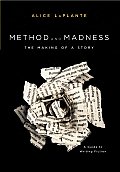 Jill: In Method and Madness, you say that sometimes unreliable narrators can be used to get at deeper truths. Is that true in Turn of Mind?
Jill: In Method and Madness, you say that sometimes unreliable narrators can be used to get at deeper truths. Is that true in Turn of Mind?
LaPlante: That's an interesting question. I think maybe that's one of the mysteries of my own encounter with Alzheimer's; there's a lot of anger and aggression that comes out. It's not just forgetting. It's not that benign, unfortunately, for most people. We ask ourselves, "Is this anger something that was there? The things she says ? are those just now coming out because some editor is gone, or is it the disease?" It's something that intrigued my siblings and me. And I don't think I know the answer to that.
Something to contemplate with Jennifer is whether a lot of the stuff that comes through as her mind deteriorates is maybe a deeper sense of self than she let people see when she was more guarded. I don't know. It's something to think about.
Jill: Did your mother, or you or your siblings, keep a journal like Jennifer's, at all?
LaPlante: No. That was strictly a device I used. I needed to get some facts into the story as efficiently as possible, so I thought that would be a good device.
Jill: As you were saying about the mystery, it gives the reader some more solid reference points, too.
LaPlante: Especially at the beginning, I wanted people to be very firmly grounded because I knew I wasn't going to take them on an easy ride. I thought I'd make it a little easier at first.
Jill: Since Jennifer frequently can't remember who she's talking to, and/or what they mean to her, you end up physically describing the same people a number of different times, and you do it differently each time. How did you think about getting character across in those circumstances?
LaPlante: That was one of the most challenging things. How do I avoid being really repetitive given that she's going to forget, for example, that Amanda's dead? How many times do I want her to say, "Oh, my God, Amanda's dead," or how many times do I want her to look at someone, not recognize them, and describe that person to herself? That was one of the trickier things, technically, that I had to decide, and you got it. Just the way you asked the question is the way I decided to tackle it.
With each remembering or re-remembering, I tried to get at a different angle ? say, as if she was seeing someone for the first time. I tried to give the reader a glimpse of something that hadn't been maybe perceived the first viewing, if that makes sense.
Jill: Yes. It's wonderful; it's a multifaceted way of presenting characters over the course of the book.
What made you decide to make Jennifer's character an orthopedic surgeon?
LaPlante: It evolved, but today I was thinking about how it all fell into place in a way that I couldn't have planned if I tried. I knew I wanted Jennifer to be highly educated and very self aware and clinical, quite capable of looking at things in an abstract way. I decided she'd either be a scientist, doctor, or lawyer, and I thought, Okay, let's make her a doctor. Then I wrote the murder, and Amanda's fingers were cut off. In the first draft, for some reason, Amanda also had an ear cut off. Luckily I realized that was way too much. Then I thought, So, Jennifer's a doctor, and the fingers are cut off in this murder; maybe she should be some sort of surgeon.
I have a very good friend from college who is an orthopedic surgeon. He's specifically a hand surgeon. I've always loved the way he talks about his profession, his love for bones and ligaments. I thought, Why don't I just steal his profession and put that in there?
So much came from that. I was delighted. I had no idea how rich that was going to be for me to explore as a part of Jennifer's character. But I ended up really enjoying creating the way she thought about the human hand and the way she thought about the body, so it all fell into place very serendipitously.
Jill: At the beginning of the book, when Jennifer still has very good days, you do a wonderful job of conveying the anthropological strangeness of dementia ? the ways she has to fake that she's remembering people, for example. Jennifer describes it like being a visitor from another planet.
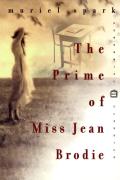 LaPlante: That was a direct observation of my mother, actually. We realized at some point how much she was faking it. My mother was always a very warm and engaging social person. People would just fall in love with her because of her ability to make them feel good about themselves. She held onto those very well developed skills when her mind started to go, to the point that she fooled one doctor who was a prominent specialist. She was doing quite a lot of faking, and it took us a while to realize that. So, yes, it was really a direct observation of the way my mother was getting through her days.
LaPlante: That was a direct observation of my mother, actually. We realized at some point how much she was faking it. My mother was always a very warm and engaging social person. People would just fall in love with her because of her ability to make them feel good about themselves. She held onto those very well developed skills when her mind started to go, to the point that she fooled one doctor who was a prominent specialist. She was doing quite a lot of faking, and it took us a while to realize that. So, yes, it was really a direct observation of the way my mother was getting through her days.
Jill: I think one of the saddest parts that comes through very strongly was Jennifer's sense of shame ? when she hears that she has kicked someone who's trying to help her or done something that she has no memory of doing and that doesn't fit in with her concept of her personality.
LaPlante: That was just me imagining what that must feel like, to be told that you've been behaving in a way that's inappropriate. So, I just made that up, but it felt right. She had a sense ? dignity is the wrong word ? but certainly a sense of herself that these things would conflict with.
Jill: She's constantly trying to, or having to, assert her person, her adulthood. She's not a rabid dog, she says. She's not a baby.
She's also frequently just wanting to go home. When she's in the nursing home, she wants to go back to her previous house. But usually it's to houses she had earlier in life, to her childhood home in Philadelphia, or just a longing for the familiar, which is very poignant.
LaPlante: One of the questions you debate a lot, as I'm sure you know, is: at what point do you try to move someone from their home to a facility? The specialist we saw said something which really stuck with me, "The time to leave home is when home isn't home any more," because apparently that's quite common. People are in their own homes, but they're longing for something else. It's strange for them. It's a strange place to them, and they're longing for familiarity. It is a very sad state for a human being to be in.
Jill: The relationships that Jennifer and Amanda have with each other and also with their husbands are fascinating. They're unique, complex friendships, and they're all very complex characters.
LaPlante: You know, that's another thing where I have no idea where those characters come from. Even Jennifer. She's not based on anyone I know, and certainly she's not my mother. These characters are completely made up from whole cloth.
The only thing I can say is that I have such horror of sentimentality that I kept giving them edges at every opportunity, to the point where some of my readers were saying, "Do they have to be so unpleasant?" [Laughter] And I'd say, "I know; it's just that I'm so anxious not to err in the other direction." I just wanted them to be real people, and not fit into any molds or stereotypes.
Jill: I like the word "edges," because it's true, they can be unpleasant. [Laughter]
LaPlante: Yes.
Jill: But they're convincing, I think, because of that. They all have very strong personalities, and it feels right that they would be attracted to each other and then also slightly jealous of each other.
How do you think about your prose, which is gorgeously arresting here?
LaPlante: Thank you. I'm very particular about every word and, at a very visceral level, I like language to have music, so I read things out loud. I'm listening to the rhythm. Things like that are really important to me. Every sentence has been gone over multiple times, so it sounds right, so it has the right music to it.
Jill: Who are some writers that you really love?
LaPlante: I love the British satirists. I've just been rereading some Muriel Spark and Evelyn Waugh and Anthony Burgess. I love that very cynical, very funny way of looking at the world and its people.
Who else? What every writer says about Alice Munro. She's amazing. I could never write like her, could never even try, but I adore her.
Jill: I'll have to read Muriel Spark, because now you and the last person I interviewed, who wrote a very different kind of novel, have both mentioned her as one of your favorites. I love Evelyn Waugh and Anthony Burgess, but I've somehow never read Spark.
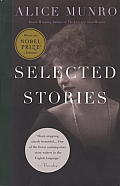 LaPlante: Oh, you're in for such a treat. I wish I could read all her stuff all over again ? and be delighted all over again.
LaPlante: Oh, you're in for such a treat. I wish I could read all her stuff all over again ? and be delighted all over again.
I've also been making the rounds of all these book conferences. Grove sent me to BEA [BookExpo America] and to all these other things. I've been picking up freebie books, and now I've got a big pile on my desk. I'm in the middle of The Tiger's Wife by Téa Obreht. I'm really enjoying that. On the plane last week I finished The Elegance of the Hedgehog, which I really liked.
I've been trying to catch up with my reading of contemporary fiction, because sometimes I fall behind, especially during the school year when I'm reading student papers. [Laughter]
Jill: Do you use some of the tools and processes you lay out in Method and Madness? And how do you balance method and madness in your own writing?
LaPlante: Yes, I absolutely use those things. They work for me and are what I've been using in teaching now for 20 years. So, those are the techniques I very much believe in.
In terms of the balance, I find that, at least lately, the madness is coming really easily. My agent keeps telling me that. She says, "You're going to have a lot of people asking you questions about how you wrote the book." And she said, "Just tell them that nothing that you're going to tell them applies to them, because you've had it too easy for this book!" [Laughter]
And I have. I've had it a little too easy with this first novel, and my next novel's almost done, and that's come very fast, too. I don't know where the stuff from the feeling, the madness, is coming from, and I'm not even going to question that.
But for the method, I find myself going back to the things I say in that book over and over and over again. It's being very conscious of technique ? things like the unreliable narrator. How do you ground the reader in reality? Things like dialogue. What makes for good dialogue? What makes for good subtext? I go back to that quite a bit. I guess I'm saying that I have to be very conscious these days more of technique than of inspiration, since that seems to be coming easier.
Jill: That's a good place to be.
LaPlante: Yes. [Laughter] Yes, I'll take that at this point in my life.